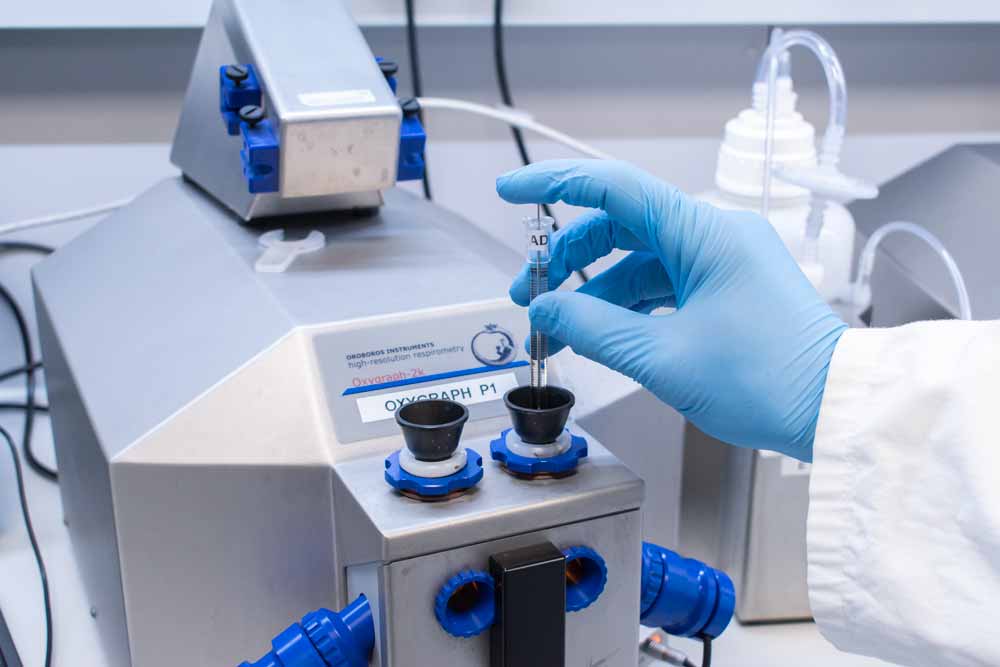
The research group studies metabolic pathways and their regulation in various human tissues and organs.
The main focus is the identification and characterization of acquired and (epi)genetic triggers of insulin resistance, diabetes mellitus and non-alcoholic fatty liver disease (NAFLD). Specific attention lies on the role of mitochondria (the cell´s “power plants”) for energy metabolism.
The aims are to gain insight into the key abnormalities of energy metabolism, which contribute to the development of metabolic diseases and allow for identifying novel options for the prevention and therapy of diabetes and its comorbidities and complications.
Aims
- Characterizing metabolic flux rates and the mitochondrial function in skeletal muscle, liver and adipose tissue in healthy humans and those with metabolic diseases
- Investigation of the role of NAFLD in the development and progression of insulin resistance and the metabolic syndrome
- Testing the effects of exercise training, diet and medication on tissue-specific insulin action and molecular mechanisms of its regulation
- Development of innovative methods for non-invasive examination of energy metabolism
The research group has made contributions to understanding of glucose transport/phosphorylation, glycogen synthesis/-lysis and gluconeogenesis in healthy individuals and humans with diabetes mellitus. The group described the cellular mechanisms of fatty acid- and amino acid-induced insulin resistance. A concept for the adaptation of mitochondrial function in the liver of obese persons was developed. Multicenter studies demonstrated the effects of differently composed nutritional lipids and blood-glucose lowering therapies for the improvement of insulin resistance and reduction of liver fat in people with type 2 diabetes.
The research group established and is developing - in collaboration with the research group Metabolic Imaging of the institute - methods using stable isotope dilution and non-invasive magnetic resonance spectroscopy to examine the fat content of different organs, concentrations of metabolites, flux rates through metabolic pathways and energy production (ATP synthesis) in human liver, muscle and brain.
Team
-
Viyan Batal
-
Dr. Bedair Dewidar
-
Olga Dürrschmidt
-
Roopali Melanie Einwächter
-
Dr. med. Sofiya Gancheva
-
Laura Gimeno Tello
-
Mona Hendlinger , M. Sc.
-
Maximilian Huttasch
-
Friedrich Jassil, Dr.
-
Dr. med. Sabine Kahl
-
Katerina Koudelkova
-
Jan-Marc Leonhard, B. Sc.
-
Dr. rer. nat. Lucia Mastrototaro
-
Dr. med. Aika Miya, MD
-
Jessica Oberhäuser
-
Sarah Piel
-
Jennifer Pützer-Furmanczak
-
Michelle Reina do Fundo
-
Merve Sahin
-
Prof. Dr. Patrick Schrauwen
-
Anita Shokouhmehr, M. Sc.
-
Paula Sonntag
-
Alexandra Stein
-
Dr. rer. med. Nina Trinks
-
Georgia Xourafa
-
Dr. Sevgican Yilmaz
-
Fariba Zivehe
-
Claudia Zundel, Dipl. Biol.
Selected Publications
- Gancheva S, Ouni M, Jelenik T, Koliaki C, Szendroedi J, Toledo FGS, Markgraf DF, Pesta DH, Mastrototaro L, De Filippo E, Herder C, Jähnert M, Weiss J, Strassburger K, Schlensak M, Schürmann A, Roden M 2019. Dynamic changes of muscle insulin sensitivity after metabolic surgery. Nat Commun. 10. https://doi.org/10.1038/s41467-019-12081-0
- Roden M, Shulman GI 2019. The integrative biology of type 2 diabetes. Nature. 576: 51-60. https://doi.org/10.1038/s41586-019-1797-8
- Gancheva S, Jelenik T, Álvarez-Hernández E, Roden M 2018. Interorgan Metabolic Crosstalk in Human Insulin Resistance. Physiol Rev. 98: 1371-1415. https://doi.org/10.1152/physrev.00015.2017
- Apostolopoulou M, Gordillo R, Koliaki C, Gancheva S, Jelenik T, De Filippo E, Herder C, Markgraf D, Jankowiak F, Esposito I, Schlensak M, Scherer PE, Roden M 2018. Specific Hepatic Sphingolipids Relate to Insulin Resistance, Oxidative Stress, and Inflammation in Nonalcoholic Steatohepatitis. Diabetes Care. 41: 1235-1243. https://doi.org/10.2337/dc17-1318
- Álvarez-Hernández E, Kahl S, Seelig A, Begovatz P, Irmler M, Kupriyanova Y, Nowotny B, Nowotny P, Herder C, Barosa C, Carvalho F, Rozman J, Neschen S, Jones JG, Beckers J, de Angelis MH, Roden M 2017. Acute dietary fat intake initiates alterations in energy metabolism and insulin resistance. J Clin Invest. 127: 695-708. https://doi.org/10.1172/JCI89444
- Gancheva S, Koliaki C, Bierwagen A, Nowotny P, Heni M, Fritsche A, Häring H-U, Szendroedi J, Roden M 2015. Effects of intranasal insulin on hepatic fat accumulation and energy metabolism in humans. Diabetes. 64: 1966-75. https://doi.org/10.2337/db14-0892
- Koliaki C, Szendroedi J, Kaul K, Jelenik T, Nowotny P, Jankowiak F, Herder C, Carstensen M, Krausch M, Knoefel WT, Schlensak M, Roden M 2015. Adaptation of hepatic mitochondrial function in humans with non-alcoholic fatty liver is lost in steatohepatitis. Cell Metab. 21: 739-46. https://doi.org/10.1016/j.cmet.2015.04.004
- Szendroedi J, Yoshimura T, Phielix E, Koliaki C, Marcucci M, Zhang D, Jelenik T, Müller J, Herder C, Nowotny P, Shulman GI, Roden M 2014. Role of diacylglycerol activation of PKCθ in lipid-induced muscle insulin resistance in humans. P Natl Acad Sci U S A. 111: 9597-602. https://doi.org/10.1073/pnas.1409229111
- Roden M, Price T, Perseghin G, Petersen K, Rothman D, Cline GW, Shulman GI 1996. Mechanism of free fatty acid-induced insulin resistance in humans. J Clin Invest. 97: 2859-2865. https://doi.org/10.1172/JCI118742
- .
National Cooperations
- Partners and associated Partners of the German Center for Diabetes Research (DZD e. V.): All Partners
- Schön Klinik, Düsseldorf: Dr. Matthias Schlensak
- Florence Nightingale KH, Kaiserswerth: PD Dr. Matthias Banasch
International Cooperations
- Yale Universität, New Haven, Connecticut, USA: Prof. Gerald I. Shulman
- Universität Coimbra, Coimbra, Portugal: Prof. John G. Jones
- Universität Texas, Southwestern Medical Center, Dallas, Texas, USA: Prof. Phil Scherer
- Universität Maastricht, Maastricht, Niederlande: Prof. Patrick Schrauwen
- Universität Lund, Lund, Schweden: Prof. Leif Groop
- Universität Padova, Padova, Italien: Prof. Giovanni Pacini and Andrea Tura
- Universität Pisa, Pisa, Italien: Prof. Amalia Gastaldelli
Competitive third-party funds
- European Commission (EUREKA Eurostars-2 E!, 113230)
- Deutsche Forschungsgemeinschaft: (DFG: CRC/SFB 1116/2 B12, GRK 2576 P3)
- Deutsche Diabetes Gesellschaft (DDG)
- Ministerium für Kultur und Wissenschaft (MKW: EFRE-0400191)
Teaching Activities at Heinrich Heine University Düsseldorf
- Diabetologisch-metabolisches Seminar (Prof. Roden)
- Klinisch-experimentelle Diabetologie (Prof. Roden)
- Endokrine Stoffwechselregulation: From bed to bench and back! (Prof. Roden)
- Experimentelle Methoden in der Diabetesforschung (Prof. Roden)
- Hot topics in molecular exercise science & endocrinology (Dr. Pesta)
- Wahlfach Immunbiologie (Dr. Pesta/Dr. Kahl/Dr. Mastrototaro/Dr. Sarabhai)
Teaching Activities at other national/international Universities
- Glucotoxicity, lipotoxicity, mitochondrial oxidative stress, MSc Program "Diabetes Mellitus and Obesity", Universität Athen (Prof. Roden)
